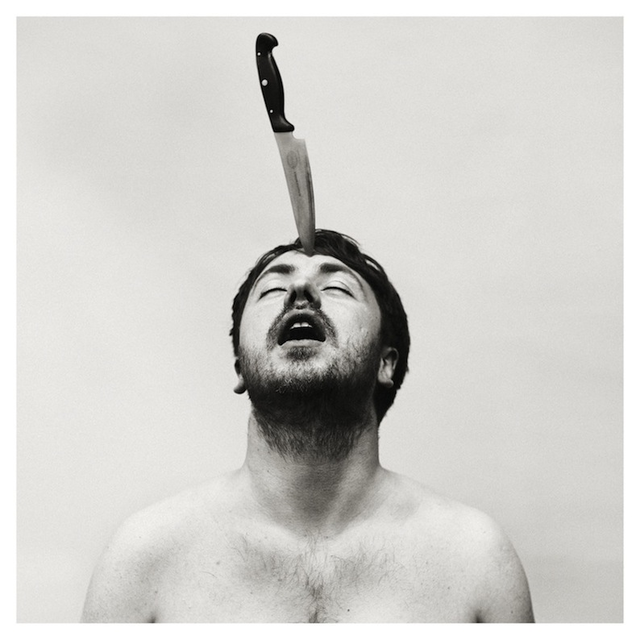-
Review:: Suicide Songs | MONEY

Money’s Jamie Lee is certainly not a stranger to self-doubt. The band’s second album, Suicide Songs, wears it on its sleeve. Literally—the album cover is a picture of the band’s singer with a knife stabbing into his forehead, not to mention its overwrought title. But despite lyrics that reflect the Manchester native’s neuroses, the band’s work shows a confidence that outstrips any worries Lee or his mates may have about their own worth. They take an ambitious swing, and it pays off.
Money had a debut album in 2013 that did an impressive job of sounding as epic as an indie band of Money’s stature (and, *ahem*, with their lack of actual money) could. They sounded like a normal-sized band with the kind and amount of instruments fledgling indie rock bands normally get their hands on, playing them with a bunch of studio tricks to make them sound bigger and more momentous than they are. They fit into a trend that’s not uncommon but definitely not unfortunate—rock bands that use digital studios and artificial reverb to create a wall of sound instead of through the cramped recording style that Phil Spector and other analog wizards worked hard to make.
Money brought talented songwriting to the formula, elevated with spacey textures that reached for magnificence. But for all the enormity of the scale, their first album ends up feeling almost safe. It certainly had good songs played well, but it fell short of true greatness, lacking a sense of intention and immediacy that could have really pushed it ahead.
Two and a half years later, Suicide Songs builds on the best parts of the band’s debut with the kind of maturity that allows the band to revel in youth. They continue the sense of a vast landscape that made their debut work, but they fill in the gaps of immense space in between the reverb, building with energy and vitality in the places that had before become inert. The instruments still echo—a single note on a high guitar string will do the work of six for most of a verse, playing on and sustaining until it melts into the background; the vocals call from across a distance, like shouts to a microphone too far away.But in between the standard rock instrumentation come more baroque instruments to weave around the soundscapes—a string section and a brass one take their part here and there to fill the songs with a substance, along with a robust percussion section. All of it fades into the wall of sound anyway, creating an especially full and lively texture. Money proves impressive at finding the big moments, the crescendos and sudden reversals, building up and tearing down the energy with excellent precision. It’s a sound rich with emotion, highlighting the best parts of the song craft.
Lee’s voice becomes overwrought and tortured as he sings about loneliness and frustration. His pipes are wounded and scarred, belting far beyond his comfortable range. It brings to mind Patrick Stickles of Titus Andronicus, a suitable comparison for someone so drenched in mopiness, ambition, and somehow through all that, hope. On the two more stripped down tracks—the title song, and the dramatic closer, “Cocaine Christmas and an Alcoholic’s New Year,” which is exactly as overdone as it sounds but totally pulls it off—he wails over instrumentation as basic as a piano. His voice cracks and shatters, and he transforms into a drunken lush, shrinking from the epic scope of the album’s biggest sweeps into a solitary moment.
It’s this mastery of scale that is the truly impressive feat of Suicide Songs. It masters the bigness of Money’s previous album, and it masters these smaller bits as well. But most importantly, Suicide Songs is an album that understands the vast expanse between.Release Date: January 29th, 2016
Rating: 4.5/5
Run Time: ~43 minutesTrack listing:
1. I Am The Lord
2. I’m Not Here
3. You Look Like a Sad Painting on Both Sides of the Sky
4. Night Came
5. Suicide Song
6. Hopeless World
7. I’ll Be The Night
8. All My Life
9. A Cocaine Christmas and an Alcoholic’s New YearWritten by Jon Hecht

Elsewhere